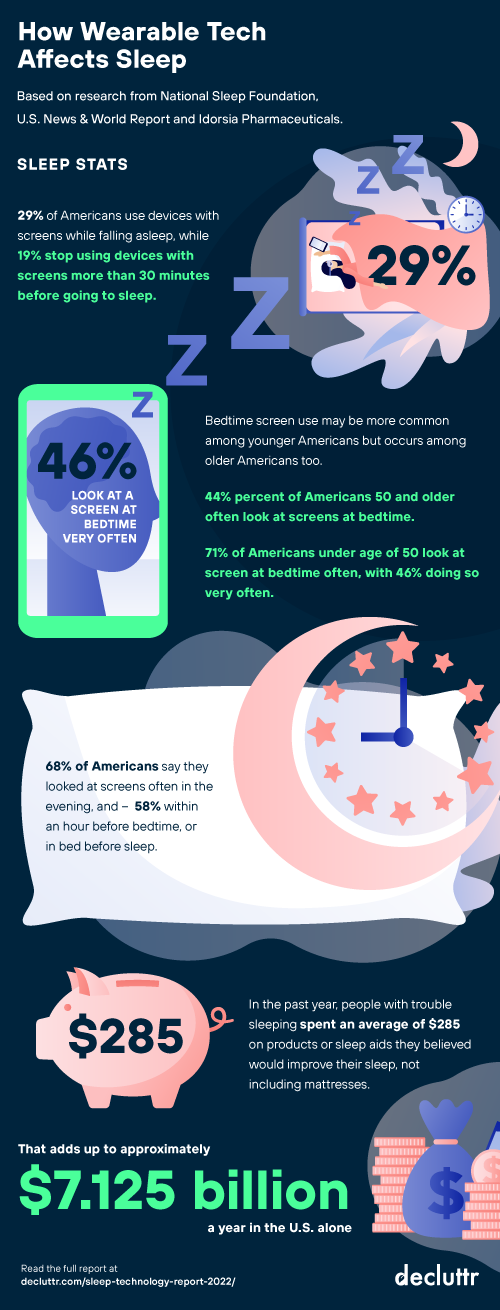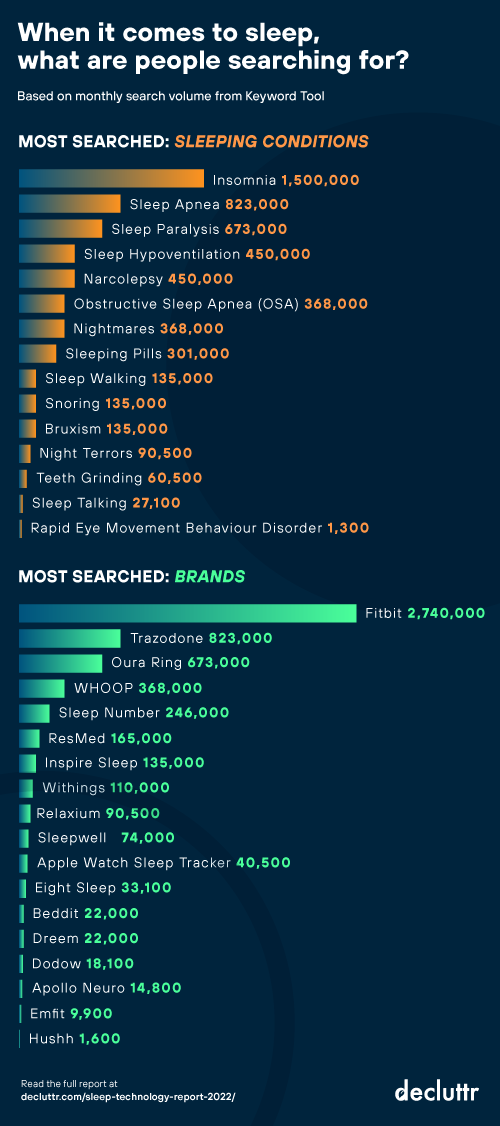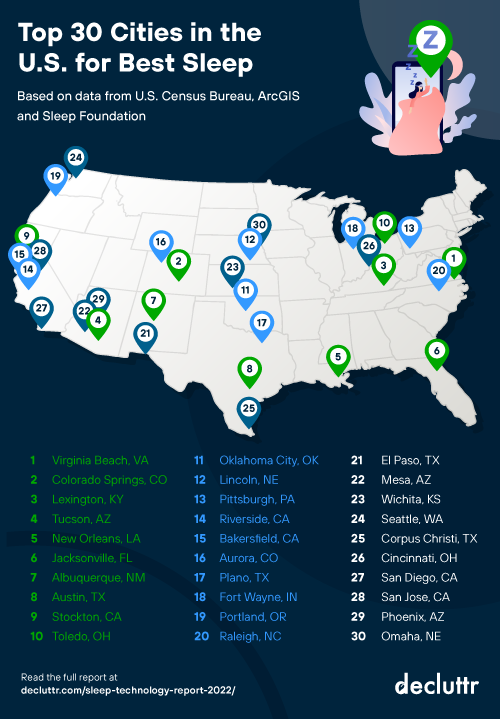- Virginia Beach, VA
Night Light Score: 13.29 | Traffic Noise Score: 36.7 | Health Score: 74.38
With the second-lowest amount of aircraft and road noise in the U.S., low night light pollution (4th on our list) along with higher percentages of healthy residents and relatively lower risks for obesity, diabetes and mental health challenges, it’s no wonder Virginia Beach is the top city for best sleep in the U.S. Positioned in the calming yet beautiful Chesapeake Bay, this welcoming coastal city has something for everyone - a delicious culinary scene, history, entertainment and the opportunity for a quality snooze.
- Colorado Springs, CO
Night Light Score: 21.29 | Traffic Noise Score: 39.76 | Health Score: 77.16
While Colorado Springs is growing rapidly, an escape from high housing prices in the Denver area, the city maintains a smaller-town feel - as residents have resisted allowing tall structures to maintain the emphasis on nature. In addition, this city has the third healthiest residents with the second-lowest amount of night light pollution (compared to the other cities on the list) and noise - making it an ideal spot to catch up on your sleep.
- Lexington, KY
Night Light Score: 11.66 | Traffic Noise Score: 38.33 | Health Score: 73.66
The city of horses, bourbon, and history is also one of the top places for quality sleep in the U.S. In addition to Southern charm, Lexington can also boast about their second-lowest night light pollution (on our list), modest traffic noise and healthy residents. Not to mention, we know this city’s residents take their sleep seriously with the highest purchase and trade-ins of wearable technology from Decluttr per-population on this list.
- Tucson, AZ
Night Light Score: 15.72 | Traffic Noise Score: 39.55 | Health Score: 74.1
Named one of the sunniest places in the U.S, this desert town has an extremely low night light score - once the sun goes down, there’s not much light in sight. In addition, Tucson has everything you need for a good night’s rest with limited road noise and high rates of healthy residents. Here you have plenty of space to relax and recharge.
- New Orleans, LA
Night Light Score: 12.49 | Traffic Noise Score: 36.25 | Health Score: 73.52
Known as the “Big Easy” for its vibrant nightlife, this party town also knows how to sleep. The city has implemented an energy efficiency program contributing to the third-lowest amount of night light pollution on our list and has the lowest amount of aircraft and road noise (compared to the other cities) and higher-than-average healthy residents, letting the good sleep roll. Not to mention, New Orleans residents have the 4th-highest purchase rate of wearable technology per population.
- Jacksonville, FL
Night Light Score: 11.05 | Traffic Noise Score: 38.96 | Health Score: 73.53
A beautiful place to explore the outdoors, Jax (as the locals call it) is also a great place to hit the hay. This Northeastern Florida city has the lowest amount of night light pollution (compared to our other picks) due to its coastal location, low traffic noise in part thanks to Jax’s national, state and city parks, and a healthy population - a solid recipe for getting great rest.
- Albuquerque, NM
Night Light Score: 23.2 | Traffic Noise Score: 41.02 | Health Score: 76.56
With one of the highest elevations of any U.S. city, the hot air balloon capital is a great place to finally rest your head. The surrounding Sandia-Manzano Mountains and interwoven Rio Grande aids in maintaining low night time pollution and traffic noise, helping this city soar when it comes to sleep quality.
- Austin, TX
Night Light Score: 20.05 | Traffic Noise Score: 40.65 | Health Score: 74.66
Even though it’s known as “weird”, that doesn’t stop Austin from getting some sleep. With some of the lowest amount of night time light in the country as well as low traffic noise (most of it covered by the numerous lakes, rivers and waterways including the well-known Lake Travis) , the nearly 1 million Austinites have everything lined up for extraordinary sleep.
- Stockton, CA
Night Light Score: 23.34 | Traffic Noise Score: 39.14 | Health Score: 73.99
Located in the Central Valley of California, Stockton is close, not only to urban attractions, but incredible outdoor adventure - and once you’ve visited either, you’re ready for a nap! Far enough from the hustle and bustle of San Francisco, this distance contributes to some of the lowest traffic noise in the nation and low night light pollution - you won’t want to rest your head anywhere else.
- Toledo, OH
Night Light Score: 34.26 | Traffic Noise Score: 39.12 | Health Score: 75.13
With the top 10 lowest aircraft and road noise in the U.S., Toledo makes for a quiet and comfortable place to sleep. Not to mention, Toledo is packed with serene places to visit or live - positioned on the western tip of Lake Erie, you can imagine the soft waves and relaxing scenery as you drift to sleep.
- Oklahoma City, OK
Night Light Score: 16.54 | Traffic Noise Score: 38.69 | Health Score: 73.34
Where modern city meets cowboy culture, Oklahoma City has a little something for everyone - including great rest! In the country’s top 10 for lowest night light pollution and traffic noise, the Oklahoma capital also has the distinct honor of being one of the biggest U.S. metropolitan areas to have embraced Clean Air Act benchmarks - ensuring healthy air and smogless skies for a calming evening walk. It’s hard to find a better spot to catch up on your Zzzs.
- Lincoln, NE
Night Light Score: 27.43 | Traffic Noise Score: 40.35 | Health Score: 74.96
The capital of Nebraska, Lincoln offers wide open spaces to relax, sit back and sleep with lower-than-average traffic noise, night light pollution and higher than average positive health factors. Plus, for any anxious sleepers in need of a relaxing evening activity, the city’s world-famous Sunken Gardens is open late and is a great place to get some exercise as well as wind-down for a quality night’s sleep.
- Pittsburgh, PA
Night Light Score: 35.33 | Traffic Noise Score: 40.32 | Health Score: 75.48
There’s always something fun to do in Pittsburgh and when you’re done, you can bet your sleep will be first-rate. Ranked as one of the healthiest cities, Pittsburgh’s proximity to the Allegheny, Monongahela, and Ohio rivers reduce urban density, resulting in lower-than-average night light pollution and traffic noise, making it a sleeper’s paradise.
- Riverside, CA
Night Light Score: 29.66 | Traffic Noise Score: 39.33 | Health Score: 74
Far enough from Los Angeles, Riverside is in the top 10 cities in the U.S. with the least amount of traffic noise, low night light pollution and relatively healthy population. With California Citrus State Historic Park packed full of oranges, lemons and grapefruits, the heavenly-scented second California city on our list, will lull you right to sleep.
- Bakersfield, CA
Night Light Score: 14.5 | Traffic Noise Score: 37.69 | Health Score: 71.68
Two in a row: the third California city on our list is Bakersfield. This city may have the third least amount of traffic noise and fifth-least amount of night light pollution on our list, however when compared to the health of residents, there’s a reason for alarm - nearly 80% of county residents are overweight or obese and have a higher rate of diabetes compared to the rest of the nation.
- Aurora, CO
Night Light Score: 18.36 | Traffic Noise Score: 44.6 | Health Score: 75.09
The second Colorado city on our list, Aurora really seems to be a sleeping beauty - with a breathtaking view of the Rocky Mountains and low night light pollution! The only deterrent is the city’s higher-than-normal traffic noise - thanks to a densely-packed Denver metro area that has struggled to expand highways or build new throughways in spite of large population growth.
- Plano, TX
Night Light Score: X | Traffic Noise Score: 39.49 | Health Score: 75.07
The second Texas city on our list, Plano is far from plain when it comes to getting primo sleep. As a suburb of Dallas, the city has all the benefits of big city life - but some of the lowest road and aircraft noise in the U.S. With minimal night time lights, nothing will keep you from falling asleep in this north Texas town.
- Fort Wayne, IN
Night Light Score: 30.74 | Traffic Noise Score: 40.39 | Health Score: 74.27
With outdoor adventures galore, Fort Wayne knows how to rest and recharge. In particular, the city has invested heavily in its riverfront trail system, known as the Rivergreenway - the perfect place for a relaxing picnic, exercise, or a casual stroll with friends. With lower than average night time light and traffic noise, this green city sleeps in.
- Portland, OR
Night Light Score: 22.68 | Traffic Noise Score: 44.75 | Health Score: 75.88
One of the few West coast cities on our list, Portland may be known for its breweries, coffeehouses and eco-minded residents but it is one of the top places to get quality sleep in the U.S. This city boasts some of the lowest night light pollution in the country and great resident health, with just a bit of higher than average road and aircraft noise but that’s nothing to yawn at.
- Raleigh, NC
Night Light Score: 23.46 | Traffic Noise Score: 39.99 | Health Score: 73.16
Last but certainly not least on our list is Raleigh, the capital of North Carolina. With the number of universities in the area you would expect to see low sleep quality but that’s not the case here! Raleigh ranks in the top 20 for both low night light and traffic noise, with only health factors weighing it towards the bottom of our list.






